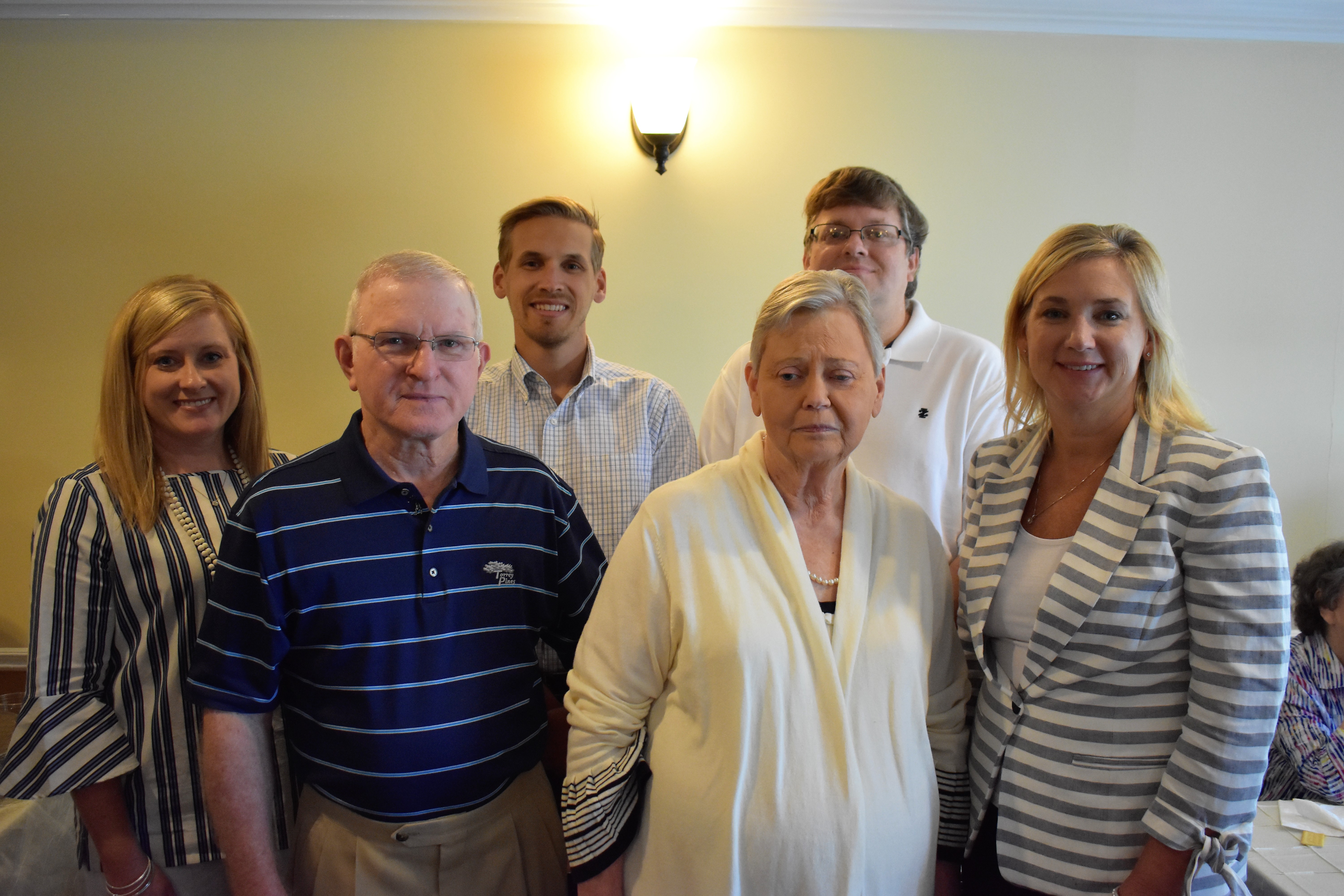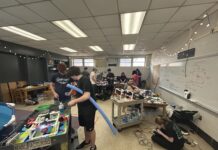Elaine Fuller and her family. L-R: daughter Jenny Malke, husband Wayne Fuller, grandson Casey Harbin, Elaine Fuller, son Jay Fuller and daughter Suzanne Harbin (W.C. Mann for The Tribune)
CULLMAN – On Thursday afternoon, the city of Cullman honored Cullman County Museum Director Elaine Fuller on her retirement, with a reception in the museum’s conference room. Members of the museum board, city and county government, family, friends and other well-wishers packed the room to celebrate her generation of service to the community.
Fuller served the museum for 31 years, coming to the leadership position in 1987 as a temporary fill-in when the previous curator left on sick leave. When that person sadly passed away, Fuller’s short-term appointment was made permanent.
Over the years, Fuller has been inducted into the Alabama Mountain Lakes Tourism Hall of Fame and the State of Alabama Tourism Hall of Fame, and she was recently honored again by the Alabama Mountain Lakes Tourism Council for her years of service to that organization.
Fuller’s son Jay Fuller shared about her honors, “I’ve been self-employed since 2001. I moved back to Cullman in 2000, after college, and mom and I have had lunch every Monday, I guess, since I moved back, pretty much; so, I’ve lived through all of this with her. And I would say a third of our conversations haven’t necessarily been about the museum, but they’ve been about tourism. And so, that’s the other side of the coin, I guess, of the work that she does, is to promote Cullman and the area, and to be part of the overall tourism industry.”
At the close of her reception, Fuller sat down with The Tribune for a little Q&A.
What has changed at the museum during your time here?
“I have remodeled, painted, redone every inch of this building since I’ve been here. Nothing is the same as it was when I came here.”
What is the most important thing you’ve brought here?
“There’s no doubt that it’s the Smithsonian exhibit that was at Wallace (State) a couple of years ago. Everyone wants a Smithsonian exhibit, but not everybody gets one, and we were fortunate enough to be chosen to host that exhibit. And we had so many people that worked on it: as docents, as people that helped us assemble it, and get it unpacked and packed back up.
“And then, we had a lot of Cullman items in that exhibit, and people were very interested in it. It also brought in a representative of the Brindley family, which is one of the older families here, and they did a couple of programs. We did a video of how people worked when they were young: what they did. And there were so many components to the exhibit that we were able to do; that just made it very interesting to the public. And we had so many school children come through, as well as adults, that we felt like it was very successful.
“And we feel like we’ll be on the list to get another one in the near future.”
Fuller also noted the Smithsonian exhibit and the local project to bring it here and put it on as the fondest museum-related memory of her career. Additionally, she shared some of her other favorite recollections:
“One of my favorite things is the video of the Civil War battle that we did. And it won second place in the film festival in Huntsville. But I was there the day that it was filmed, and it was such an exciting day; it was just amazing how they did it.
“I’m very proud of Oktoberfest and how they have developed over the years: from being a small program on the front porch of the museum or dinner at Stiefelmeyer’s into a small tent behind the museum, to the big tent behind the museum, to the Festhalle where it’s located now–just being able to grow the festival and promote it and see how it has brought people in over the years. I think that’s probably one of my favorite memories.”
Fuller talked about the museum’s contribution to the 1996 Olympics through an Alabama exhibit in Linn Park in August of that year, saying, “We kind of recreated some rooms in the Colonel Cullman home. And at the time, Charlie Dobson owned the All Steak, and he gave us 500 orange rolls every day, and we baked them in the back of his catering truck. And it was so hot, we were about to pass out, but people would come by and say, ‘And what time will the orange rolls be ready?’ And they would be standing in line waiting for those orange rolls. They’d be gone in 10 minutes. But we had that exhibit and we were down there for two weeks, and it was wonderful.”
What do you want people to know about the museum you’re leaving them?
“I would want people who have never been here to come and enjoy what we have, because there are people that come in every day from other states, and they are so excited over our museum. Yet we still have people in Cullman County who have never come in. And it’s free during Oktoberfest, so we would encourage people to come and see the museum.”
What’s next for you?
“I have several projects at my home that I’ve been putting off that I’m going to be working on. I’ve had a nonprofit group approach me about helping them with bylaws and constitution. It’s a new group, and I’ll be working with them some.”
When they tell your story, what do you want people to remember about your career at the Cullman County Museum?
“I guess I want them to remember the changes I have made: how I have brought the museum forward as the years go by, by changing things up and always making it interesting, doing different exhibits.”
Said Jay Fuller, “We’ve spent a lot of time in this building, and she’s been a very dedicated person. This has been her life for a long time.”
The Cullman County Museum is located at 211 Second Ave. NE in downtown Cullman, across the street from Cullman City Hall. For more information, call 256-739-1258 or visit http://cullmancountymuseum.com.
Copyright 2018 Humble Roots, LLC. All Rights Reserved.



















